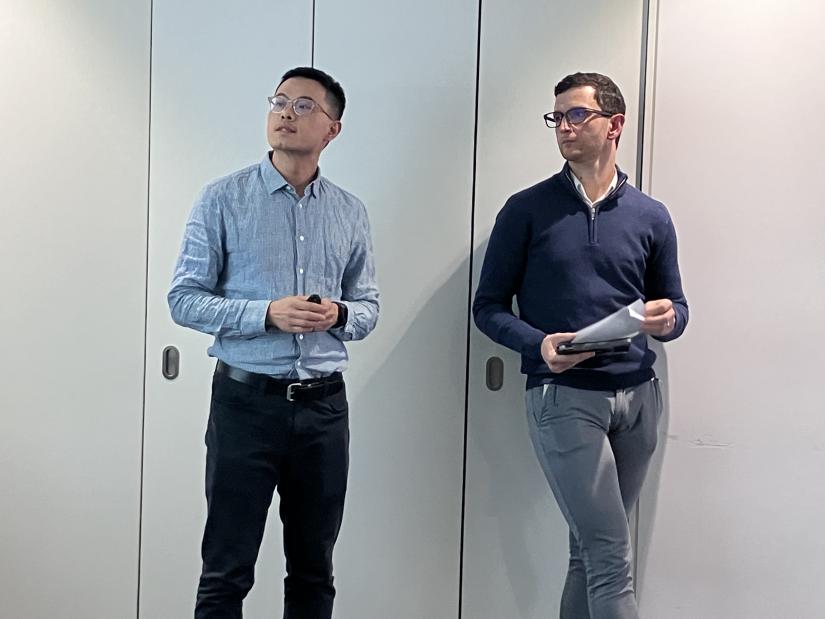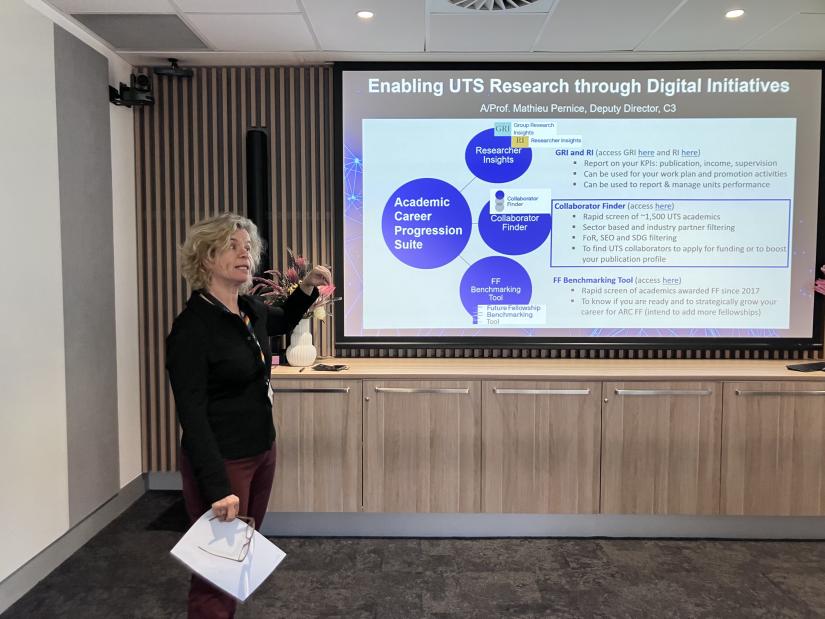Research Café invited four data experts to provide insights into how UTS researchers can tap into the transformative power and potential of eResearch tools to drive research and innovation.
Take advantage of eResearch tools and services

Caption
A/Prof Mathieu Pernice speaking at Research Cafe
A passionate advocate for data-driven research, A/Prof Mathieu Pernice began the session by discussing the value of leveraging data to support career progression and enhance research outcomes.
As product visionary, Mathieu has been involved in the development of the UTS Academic Career Progression Suite, an initiative that includes four data tools: Researcher Insights, Group Research Insights, Collaborator Finder and the ARC Future Fellowship Benchmarking Tool.
“These tools are designed to provide real-time data and insights on UTS-wide research, helping researchers make informed decisions about their careers and collaborations, “ Mathieu explained.
Introducing the UTS Academic Career Progression Suite
- Researcher Insights - displays current and historical research activity of up to 5 years. The dashboard provides easy, transparent and up to date access to your personal research data, including that held in several of the university’s databases such as HDR student enrolment, progression and completions data as well as any research income including grants and donations.
- Group Research Insights - provides an easy way for research group leaders to track collaborative research activity, research outputs, income and HDR data. Includes information about both publications and non-traditional research outputs and tracks HDR load and completions so that research managers can see information aggregated across their group as well as the information of the individuals they manage. The dashboard provides easy, transparent and up to date access to research data.
- Collaborator Finder - A Power BI tool for researcher career development, Collaborator Finder enables you to identify collaboration opportunities and find collaborators based on project and publication details as well as industry engagement with the recent addition of a Deep sector filtering option. It helps you discover potential co-investigators for funding based on income categories and search for potential co-authors based on publication data.
- Future Fellowship Benchmarking Tool – a tool that allows you to compare your performance with Future Fellows in your own discipline since 2017. You can drill down into the Fellow’s individual bibliometrics and ARC grant history and explore overall statistics for this cohort. By tracking some of your current metrics against past successful ARC Future Fellows within the same Field of Research (FoR) code and academic level (FT Level), this tool can help you assess your readiness and strategically plan your career, enabling more informed decisions about awards and fellowship applications over the longer term.
"Our vision in developing these platforms is to encourage our researchers to really to use the data that we are producing at UTS in order to help growing their careers more strategically,” Mathieu said.
He particularly recommends use of the Collaborator Finder Tool, launched in September 2022, that effortlessly provides a rapid screen of all UTS academics based on keywords.
Our vision in developing these platforms is to encourage our researchers to really to use the data that we are producing at UTS in order to help growing their careers more strategically.
“The tool is very useful for quickly finding interesting UTS collaborators to boost your research funding, publication profile or industry engagement, especially with the recent addition of a deep sector filtering option” he said.
Remote video URL
Develop data skills with Intersect
Intersect Australia’s lead data scientist Glenn Charlton and digital research analyst Jianzhou Zhao then explained how they support researchers to use emerging digital research technologies, including advanced analytics and AI platforms.
“Intersect is a member-owned organisation that enables productive research through the application of advanced information technology and skills,” explained Jianzhou.


“Our services are available to all UTS researchers and include a wide range of digital research training that covers the whole research lifecycle, from data collection, data management, data analysis, programming and reporting.”
Glen said that Intersect’s analytics and AI team are comprised of expert data scientists who come from a research background.
“That’s why we understand the research landscape and how you operate,” he said, adding that data science is offered as a research service.
“We get involved hands on with your research project and help you with all your data science needs. For example, we're currently developing solutions for image processing for remote sensing to capture camera trap data for ecology researchers,” he said.
Our services are available to all UTS researchers and include a wide range of digital research training that covers the whole research lifecycle.
“We've also been working on machine learning models for animal behaviour analysis on a large scale, and developing data pipelines and processing methods to enhance reporting and research outcomes within an allied health initiative.”
Intersect has also developed AI training boot camps that are specifically designed to upskill researchers in generative AI, computer vision, machine learning, operations as well as reinforcement learning.
Get to know UTS eResearch platforms and services
The session concluded with a presentation from Anastasios Papaioannou, eResearch Platforms & Services Manager in the UTS Information Technology Unit who discussed how the UTS eResearch platforms and services can help researchers and HDR students to enable their research.
Before he moved into the eResearch area, Anastasios was working on medical physics/biophysics research problems, running fluid dynamics simulations and molecular modelling.


“I used mainly super computers to solve various research problems and run my simulations, and that's how I learned about all of these digital research platforms and technologies,” he said, defining eResearch as the use of advanced technologies and digital tools to enhance research practice.
“Anything from scripting and programming all the way to research data storage at scale, or research computing that you need to do part of your research.”
UTS is unique in providing these platforms and tools to researchers, and this is a really good thing. Please help us grow awareness about them and the support we offer at UTS.
“UTS is unique in providing these platforms and tools to researchers, and this is a really good thing. Please help us grow awareness about them and the support we offer at UTS.”
Anastasios then went on to describe seven services and platforms available to UTS researchers, including HDR students:
- Research Computing: “Forget about laptops. We're talking about large-scale compute infrastructure, the kind you see in movies. UTS provides access to these powerful machines to support your research needs.”
- Research Data Storage: “Beyond OneDrive or SharePoint, we offer UTS researchers dedicated research storage for research data. This ensures your data is stored properly and securely.”
- Skills Training: “UTS offers comprehensive training programs run by UTS eResearch in collaboration with Intersect. Whether it's programming or high-performance computing, there's a training program that will help you, and you can find them all listed as events on the RES Hub website.”
- Advisory and Support: “Need advice on how research technologies can enable your research? The eResearch team is here to help. We can offer you guidance on best practices and tool usage.”
- Survey Tools: “UTS provides access to survey tools for research, each suited to different use cases. Whether it's REDCap or Qualtrics, there's a tool for your needs. Just ask us.”
- AI Adoption: “The eResearch team is working closely with the Office of the Deputy Vice-Chancellor Research to promote the use of responsible AI in research. Guidelines are available on RES Hub and further resources are being developed to ensure ethical AI practices.”
- Other Tools and Platforms: “From LabArchives for electronic notebooks to GitLab for collaborative coding, UTS offers a range of platforms to support your research. You can access them from RES Hub here.”
“The eResearch team is here to advise and support your research endeavours. Whether you're a HDR student or an academic, all of these resources are freely available to you,” Anastasios said, encouraging the UTS research community to take advantage of the tools, expertise and resources available to them.